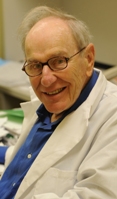
Morris Goodman, Ph.D., distinguished professor of Anatomy and Cell Biology, and a much beloved member of the Wayne State University School of Medicine family, died Nov. 14. He was 86.
In his 52-year career at Wayne State, Dr. Goodman touched countless lives and was a highly respected scientist and person.
"We will all miss him dearly," said Valerie M. Parisi, M.D., M.P.H., M.B.A., dean of the School of Medicine. "We were fortunate to know and work with him, and even more fortunate that future generations of scientists will build their studies upon the foundations that he laid."
Dr. Goodman, also a professor in the Center for Molecular Medicine and Genetics, is known worldwide for his research in molecular evolution and molecular systematics. His original and innovative research created the foundations for molecular phylogenetics, an entirely new and important scientific field that employs protein and DNA sequences to decipher the course of evolution of humans and other species. In becoming a leading scientist pursuing molecular studies of evolution, Dr. Goodman set forth seminal ideas about the processes and patterns of molecular evolution.
"Morris was a superb scientist, yet humble for all of his achievements," said Linda Hazlett, Ph.D., distinguished professor and Chair of the Department of Anatomy and Cell Biology. "He is a role model for a life of dedication to his work, his university, and also of utmost importance to him, his late wife, Selma and his children. We have lost a wonderful colleague and friend."
In 1962, Dr. Goodman's assertion that chimpanzees and gorillas are genetically more closely related to humans than to other apes, and thus should be placed in family Hominidae rather than Pongidae, sparked debate. However, his research based on molecular evidence has since been generally accepted, including a later discovery from DNA sequences that chimpanzees and humans are more closely related to each other than either is to gorillas or other apes.
The Morris Goodman, Ph.D., and Selma Goodman Endowed Chair in Molecular Anthropology was established in June 2008 to recognize faculty scholarly achievement and to support interdisciplinary research in phylogenomics, the science of determining the function of a gene based on its evolutionary history, and tracing a species' evolution by combining the information from genes or entire genomes. The chair supports the furtherance of research and the advancement of knowledge in the evolution of humans and other mammals.
"Morris Goodman, besides being one of the giants of molecular evolution, was an unpretentious person with the gift for treating almost everyone he met with kindness and respect," said Lawrence Grossman, Ph.D., professor of Molecular Medicine and Genetics and the Henry L. Brasza director of the WSU Center for Molecular Medicine and Genetics. "We worked together for 15 years, combining mitochondria and molecular evolution, and it never stopped being a privilege to watch him make inspired leaps. This will be a real loss, for the institution, for the field, but perhaps most intensely for those here and elsewhere who were part of his intellectual family."
Dr. Goodman was a member of numerous professional societies, published hundreds of articles, gave plenary lectures at international congresses and was the founder and editor-in-chief of the journal Molecular Phylogenetics and Evolution. In 1996 he received the prestigious honor of being elected a Fellow in the American Academy of Arts and Sciences. In 2002, Dr. Goodman received the Charles R. Darwin Award for Lifetime Achievement from the American Association of Physical Anthropologists and was elected to the National Academy of Sciences.
He is survived by his children, Louise Goodman of Seattle, Wash,; Julia (David) Barnes of Port Orford, Ore.; and David Goodman of Romeo, Mich.; and grandson, Matthew Barnes. He was predeceased by his wife, Selma.
A memorial service has been scheduled for 3 p.m. Dec. 3 at the Birmingham Temple. In lieu of flowers, the family asks that donations be made to the Morris Goodman, Ph.D., and Selma Goodman Endowed Chair in Molecular Anthropology.